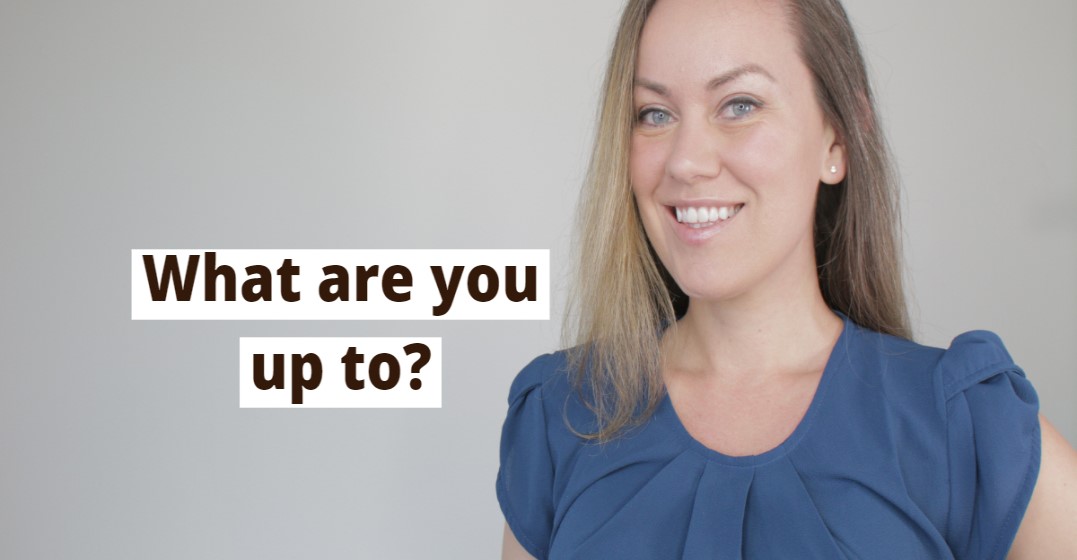Updated on October 7, 2024

What does the question “what are you up to?” actually mean?

“What are you up to?” is a common English phrase used to inquire about someone’s current activities. It’s a casual way to ask “What are you doing?” or “What have you been doing?” and is frequently used in text messages and conversations between friends. While it’s often a harmless question, it can also be used to imply suspicion when someone seems secretive or evasive. Let’s explore how you respond to the question, when to use the question and how to pronounce it.
Your friends and people you know might ask you “What are you up to?” How do you respond to this question? You might be eating lunch, watching TV, or working. It’s a casual way saying hello and maybe starting a conversation with you. Let’s see how you can easily answer this question in a variety of situations.

“Up to” is one of those pesky little phrasal verbs that you can’t translate literally. It just means doing something. So the question “What are you up to?” just means “What are you doing?”
Here’s a sample conversation between friends:
Jana: Hi, Rob, how are you?
Rob: Hey, Jana. Good, thanks, you?
Jana: I’m good. What are you up to?
Rob: Oh, I’m just making dinner.
Jana: Nice. What are you making?
So the question, “What are you up to?” can mean “What are you doing right now? Are you busy? Do you have time to talk?”



Here’s another example:
Jana: Hi Rob, how are you?
Rob: Hey Jan. Good, thanks, you?
Jana: I’m good. What are you up to?
Rob: I’m just leaving for work. I’m sorry I can’t really talk right now.
Jana: It’s ok. I’ll catch you later. Bye.
It’s okay if you are busy and can’t talk. Just tell your friend that you can talk later. Are you doing something interesting? Tell them! You can have a good conversation about it. Are you tired, and just don’t really want to chat right now? That’s okay, too.
Now we know how to use and respond to the question “What are you up to?” but what about how to respond to the question “What HAVE you BEEN up to?”
If you are talking to a person you used to know, maybe a friend or a family member you haven’t seen in a long time, the question might change into the present perfect – “What have you been up to?” Now they are asking about things that have happened in your life since the last time you talked. You’ll probably answer a little differently.
Here’s a conversation between a brother and sister who haven’t seen each other in a year:
Mia: Paulo, it’s so good to see you! What have you been up to?
Paulo: Hi Mia! I’m fine, still working a lot. How about you? What have you been up to?
Mia: Oh, the kids are keeping me busy. Tomas is playing soccer this fall. Roberto got a new job and we moved to Chicago three months ago.
Paolo isn’t asking Mia what she is doing right now. He wants to know what’s been happening in her life in the year since they last saw each other. If you have sad news to share, it’s okay to answer the question that way.
Mia: Paolo, it’s so good to see you! What have you been up to?
Paolo: Hi Mia! Nothing much. Ricarda has been in the hospital. She hurt her back at work.
Mia: Oh, I’m sorry! I hope she’s doing better now.
Paolo: Yes, she’s getting better, thanks. So what have you been up to?



Here’s something else to watch for – many times, in casual conversation, this phrase is said pretty fast. Instead of “What are you up to?” listen for “Whatcha up to?” or even “Whatchup to?”
English stresses the words “what” and “up,” and the word “you” is said very quickly with no stress. “You” can even become “cha”… and the word “are” disappears completely! Once you’ve heard it a few times, though, it’s easy to understand. Read about 7 tips for learning English (and other languages).
Lots of times, people answer the question “What are you up to?” with “Not much,” or “Nothing.” Then they will ask their friend the same question, and it becomes another way to say hello between friends.
Harold: Hi John, what are you up to?
John: Oh, not much. What are you up to?
Harold: Nothing much. If you’re not too busy, want to go get dinner?
John: Sure, that sounds great.
“What are you up to?” is a pretty easy question to answer, because the person who is asking is usually a friend or a family member. You can be honest with them! The question might be an invitation to have a conversation, and that’s what it’s all about!


